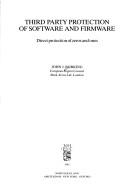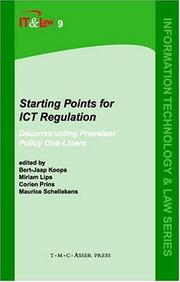| Listing 1 - 10 of 55 | << page >> |
Sort by
|
Book
Abstract | Keywords | Export | Availability | Bookmark
 Loading...
Loading...Choose an application
- Reference Manager
- EndNote
- RefWorks (Direct export to RefWorks)
Computers --- Law and legislation --- France --- Computer science --- Computers - Law and legislation - France
Book
ISBN: 0511698682 1107200717 9786612393242 0511647190 1282393243 0511804164 0511651279 051157956X 0511578822 0511580304 9780511651274 9780511577727 0511577729 9780521886505 0521886503 9780511804168 Year: 2009 Publisher: Cambridge New York Cambridge University Press
Abstract | Keywords | Export | Availability | Bookmark
 Loading...
Loading...Choose an application
- Reference Manager
- EndNote
- RefWorks (Direct export to RefWorks)
Computers and the Law provides readers with an introduction to the legal issues associated with computing - particularly in the massively networked context of the Internet. Assuming no previous knowledge of the law or any special knowledge of programming or computer science, this textbook offers undergraduates of all disciplines and professionals in the computing industry an understanding of basic legal principles and an awareness of the peculiarities associated with legal issues in cyberspace. This is not a law school casebook, but rather a variety of carefully chosen, relevant cases presented in redacted form. The full cases are available on an ancillary Web site. The pervasiveness of computing in modern society has generated numerous legal ambiguities. This book introduces readers to the fundamental workings of the law in physical space and suggests the opportunity to create new types of laws with nontraditional goals.
Book
Year: 1991 Publisher: New York London Toronto E. Horwood
Abstract | Keywords | Export | Availability | Bookmark
 Loading...
Loading...Choose an application
- Reference Manager
- EndNote
- RefWorks (Direct export to RefWorks)
Periodical
ISSN: 07723660 Publisher: Bruxelles Paris Story-Scientia. Librairie générale de droit et de jurisprudence.
Abstract | Keywords | Export | Availability | Bookmark
 Loading...
Loading...Choose an application
- Reference Manager
- EndNote
- RefWorks (Direct export to RefWorks)
Droit --- Informatica --- Informatique --- Périodiques --- Recht --- Tijdschriften --- Computers --- Law and legislation --- Periodicals --- #RBIB:TSCAT --- #BA01116 --- Computers - Law and legislation - Europe - Periodicals
Book
ISBN: 9781849808767 9781849808774 1849808767 1849808775 Year: 2015 Publisher: Cheltenham Edward Elgar Publishing
Abstract | Keywords | Export | Availability | Bookmark
 Loading...
Loading...Choose an application
- Reference Manager
- EndNote
- RefWorks (Direct export to RefWorks)
This timely book tells the story of the smart technologies that reconstruct our world, by provoking their most salient functionality: the prediction and preemption of our day-to-day activities, preferences, health and credit risks, criminal intent and spending capacity. Mireille Hildebrandt claims that we are in transit between an information society and a data-driven society, which has far reaching consequences for the world we depend on. She highlights how the pervasive employment of machine-learning technologies that inform so-called 'data-driven agency' threaten privacy, identity, autonomy
Book
ISBN: 9782130626152 2130626157 Year: 2013 Publisher: Paris : Presses universitaires de France,
Abstract | Keywords | Export | Availability | Bookmark
 Loading...
Loading...Choose an application
- Reference Manager
- EndNote
- RefWorks (Direct export to RefWorks)
Cet ouvrage, écrit à quatre mains par un juriste et un informaticien, tous deux universitaires mais également praticiens, présente de façon exhaustive les questions juridiques relatives au logiciel. Parce que les licences libres questionnent le droit de façon originale, plusieurs développements leur sont également consacrés. L'ouvrage est organisé en cinq chapitres, qui présentent chacun une grande problématique : l'histoire des logiciels (qui décrit le processus d'extension du droit d'auteur aux logiciels), l'écriture des logiciels (titularité des droits d'auteurs de logiciels, modalités d'intégration des contributions), leur utilisation (en abordant les questions connexes de l'interopérabilité, des mesures techniques de protection et des brevets logiciels), la diversité des licences (catégories de licences libres et non libres, modalités de combinaison de modules logiciels placés sous des licences différentes), et l'économie des logiciels (en présentant l'impact des types de licences libres sur les modèles économiques de la création logicielle, ainsi que la question des marchés publics).
Computer software --- Comparative law --- Electronic data processing --- Logiciels --- Droit comparé --- Informatique --- Law and legislation --- Droit --- Computers --- Droit comparé --- Computers - Law and legislation - France

ISBN: 0444876774 9780444876775 Year: 1985 Publisher: Amsterdam North-Holland
Abstract | Keywords | Export | Availability | Bookmark
 Loading...
Loading...Choose an application
- Reference Manager
- EndNote
- RefWorks (Direct export to RefWorks)
Copyright --- Computer programs --- Computers --- Patents --- Law and legislation --- Patents. --- Law and legislation. --- Computer programs. --- Copyright - Computer programs --- Computer programs - Patents --- Computers - Law and legislation
Book
ISBN: 0191747998 0191652806 9780191652806 9780191747991 0199655014 9780199655014 0191652814 9780191652813 Year: 2014 Publisher: Oxford
Abstract | Keywords | Export | Availability | Bookmark
 Loading...
Loading...Choose an application
- Reference Manager
- EndNote
- RefWorks (Direct export to RefWorks)
Recent years have seen a significant increase in the scale and sophistication of cyber attacks employed by, or against, states and non-state actors. This book investigates the international legal regime that applies to such attacks, and investigates how far the traditional rules of international humanitarian law can be used in these situations.
Internet --- Computer networks --- Computer crimes --- Law and legislation. --- Computers --- Criminal law --- Cyberspace --- Law and legislation --- Criminal provisions --- Internet - Law and legislation --- Computers - Law and legislation

ISSN: 15702782 ISBN: 9789067042161 9067042161 Year: 2006 Volume: 9 Publisher: The Hague TMC Asser Press
Abstract | Keywords | Export | Availability | Bookmark
 Loading...
Loading...Choose an application
- Reference Manager
- EndNote
- RefWorks (Direct export to RefWorks)
What does the term 'on-line' mean? When do we actually enter the on-line environment and leave the 'off-line' world? Is it different, separate, or even unique compared to the off-line world? In what cases do we need to regulate it, and how? These have become important, but complex questions for law-makers, policy-makers, regulators, and politicians who design regulatory frameworks to address societal changes related to fast-moving technological developments. In order to more consistently and effectively deal with ICT and Internet regulation, governments and international organizations have developed regulatory 'starting points', such as 'what holds off-line, must hold on-line' and 'regulation should be technology-neutral'. This book questions these regulatory starting points in detail and systematically explores their application, meaning and value for international e-regulation.
Human rights --- Computer. Automation --- Legal theory and methods. Philosophy of law --- Information technology --- Computers --- Internet --- Law and legislation. --- Cyberspace --- Technology and law --- Law and legislation --- Information technology - Law and legislation. --- Computers - Law and legislation. --- Internet - Law and legislation. --- Acqui 2006
Book
ISBN: 9783642050787 9783642050770 3642050778 3642426298 3642050786 9786612836206 128283620X Year: 2010 Publisher: Berlin, Heidelberg Springer Berlin Heidelberg
Abstract | Keywords | Export | Availability | Bookmark
 Loading...
Loading...Choose an application
- Reference Manager
- EndNote
- RefWorks (Direct export to RefWorks)
Patent laws are different in many countries, and inventors are sometimes at a loss to understand which basic requirements should be satisfied if an invention is to be granted a patent. This is particularly true for inventions implemented on a computer. While roughly a third of all applications (and granted patents) relate, in one way or another, to a computer, applications where the innovation mainly resides in software or in a business method are treated differently by the major patent offices in the US (USPTO), Japan (JPO) and Europe (EPO). The authors start with a thorough introduction to patent laws and practices, and to related intellectual property rights, also explaining the procedures at the USPTO, JPO and EPO, and, in particular, the peculiarities in the treatment of applications centring on software or computers. Based on this theoretical description they then present, in a very structured way, a comprehensive set of case studies from differing areas including business methods, databases, graphical user interfaces and digital rights management. Each set starts with a short description and claim for the "invention", explains a patent examiner’s likely arguments, then eventually refines step by step to avoid basic reservations against the content. All of these case studies are based on real-world examples, and will thus give an inexperienced developer a strong sense of the level of technical detail and description that should be provided. Together, Closa, Gardiner, Giemsa and Machek have more than 70 years experience in the patent business. With their academic backgrounds in physics, electronics engineering and computer science, they know both the legal and the technological subtleties of computer-based inventions. With this book, they provide a guide to a patent examiner’s way of thinking in a clear and systematic manner, helping to prepare the first steps towards a successful patent application.
Computer Science. --- Legal Aspects of Computing. --- Commercial Law. --- Law and Economics. --- Computers and Society. --- Computer science. --- Computers --- Commercial law. --- Informatique --- Ordinateurs --- Droit commercial --- Law and legislation. --- Droit --- Computer science --- Law and legislation --- Computers_xLaw and legislation. --- Patent laws and legislation --- Computer software --- Computer programs --- Law, General & Comparative --- Computer Science --- Law, Politics & Government --- Engineering & Applied Sciences --- Patents --- Patent laws and legislation. --- Law, Patent --- Scientific property --- Computers and civilization. --- Computers. --- Law and economics. --- Industrial laws and legislation --- Industrial property --- Trade regulation --- Copyright --- Informatics --- Science --- Economics and jurisprudence --- Economics and law --- Jurisprudence and economics --- Economics --- Jurisprudence --- Business --- Business law --- Commerce --- Law, Commercial --- Mercantile law --- Law --- Law merchant --- Maritime law --- Cyberspace --- Civilization and computers --- Civilization --- Automatic computers --- Automatic data processors --- Computer hardware --- Computing machines (Computers) --- Electronic brains --- Electronic calculating-machines --- Electronic computers --- Hardware, Computer --- Computer systems --- Cybernetics --- Machine theory --- Calculators --- Computers - Law and legislation --- Computers - Law and legislation - Japan --- Computers - Law and legislation - United States --- Computers - Law and legislation - Europe --- Computer science - Law and legislation
| Listing 1 - 10 of 55 | << page >> |
Sort by
|

 Search
Search Feedback
Feedback About UniCat
About UniCat  Help
Help News
News